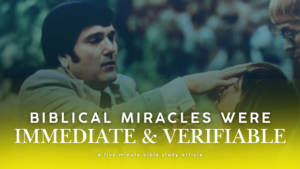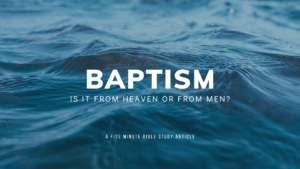What is Super Faith?
I’m reading Salvation By Allegiance Alone by Matthew Bates. His second chapter is called “What Faith Is Not.” In the chapter discussion, Bates corrects the oft made false assumption that faith is “A Leap in the Dark” as he calls it. This description of “A Leap in the Dark” he draws from a scene in some Indiana Jones movie (which I’ve not seen), where Indiana Jones steps off a ledge into the utter blackness, taking a leap in the dark, trusting that God will save him. Thankfully God does save him. My own name for this type of faith and associated behavior is Irrational Trust or Super Faith. Many self-identified strong Christians have just such an irrational trust in God, believing that He will protect them from just about anything. They think that God is more pleased with motorcycle riders who ride with no helmet because they trust in God as opposed to cautious motor vehicle drivers who triple check their seatbelts every time they get in the car. The latter is chalked up to fear, the former I have dubbed Super Faith. Abraham offering up Isaac is a biblical example used to support this definition. The problem with using Abraham as an example of this kind of faith (Irrational Trust or Super Faith) is that Abraham already possessed established evidence for trusting in God. After all, God miraculously gave Abraham the very son whom he had placed on the altar at the Lord’s command. Abraham was not taking a leap in the dark. Abraham was exercising rational trust in God based on the word of God. The book of Hebrews reveals that Abraham fully expected Isaac to die, trusting that God could even resurrect Isaac if He so pleased (Heb. 11:19).
Putting Super Faith to the Test
Now that we know what Super Faith is, let’s test this definition shall we? All this talk about irrational trust and Super Faith reminds me of some frequently made illogical statements and arguments I heard put forth during the COVID pandemic. These logical fallacies are not peculiar to COVID circumstances, but COVID still illustrates the fallacy well. I heard many a good hearted Christian say, “God wouldn’t ask us (Christians) to do something like drink from one cup in communion if He knew it would be potentially dangerous and/or even deadly to participate in.” Actually, this is a common statement which finds its origins way back before COVID. Other good hearted Christians would say this in response to sanitation concerns from common-cup communion as early as the early 1900’s if not sooner. To be clear, this statement is often made by the person arguing that God will, without doubt, and by special providence, supernaturally protect His children that drink out of the common cup of the Lord’s supper. Now, I believe God can and may protect His people from germs in communion, but I refuse to say that God does protect them, because I have found no evidence in the word of God for such a bold claim. While the claim that God does providentially protect the communion participants is certainly made with the utmost sincerity and a deep conviction in the power of God, it undermines biblical faith; the faith that saves; the faith of Abraham. “Preposterous!” you say? Keep reading.
What Does This Mean for Faithfulness?
Staying on theme with the one cup used in the Lord’s supper, God has nowhere promised in His word to providentially protect the communicants from germs and/or death that may result from drinking out of the same cup. No one attempts to establish this fact to the contrary based on some kind of scripture, at least none that I have heard. No one even quotes the overquoted “faith comes by hearing and hearing by the word of God” rubric found in Romans 10:17, because nowhere in God’s word can a person hear of such a providential promise. So, do we stop communing out of one cup, because it is potentially unsanitary? Should we resort to finding some special-pleading-exception clause that nullifies faithfulness to God’s commands in stressful circumstances like COVID? No. That’s not what I’m saying. What I AM saying is this: our faithfulness to God’s commands that fly in the face of danger is never predicated on whether or not the command is safe. I am also saying that those who claim to have some type of Super Faith in the providential protection of God to keep them free from injury and death while riding without a helmet…this Super Faith is really no more valid than what we call Blind Faith, and it unwittingly implies that God’s commands are predicated on the promise of safety.
Super Faith and Blind Faith are one and the same: trust without evidence.
Super Faith lacks any confirmation from the word of God. Super Faith is irrational. Super Faith in God won’t suddenly turn stupid decisions into smart decisions. Super Faith in God won’t suddenly make ambivalence a virtue. What we can know for sure from the word of God is that the sun will rise on the just and the unjust (Matt. 5:45), faithfulness to God will result in persecution and discomfort (Matt. 10:16-33), doing His will does not irrevocably guarantee long life and peace (2 Cor. 11:22-32). I’ve seen enough faithful children of God die prematurely to know that faithfulness to God’s commands does not come with some fairy-tale protection policy. The calling of our promise-keeping God is to trust His proven word no matter the outcome, not as an exercise of some irrational Super Faith, but because God has proven He is sovereign and in control no matter earthly outcomes. And what happens on this earth is not the final outcome.
In Conclusion: Let’s Make a Deal
So let’s make a deal. Let’s agree to stop making bad arguments in the name of possessing Super Faith. Let’s stop saying things like, “God wouldn’t put me in a position where I have to choose between loving my enemies and killing them in order to defend my family.” Let’s stop saying “God wouldn’t fill in the blank…” when there exists absolutely nothing in God’s holy word to substantiate our emotionally laden claim that God will or will not do X, Y, or Z. Let us instead trust in what God has said in scripture, and as difficult as the consequences of faithfulness to God may be, let us cling to the cross of Christ in doing the difficult. As a result, we will not criticize the Christian who triple checks his seatbelt, nor will we parade the Christian who sleeps with her doors unlocked.



